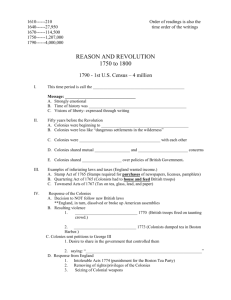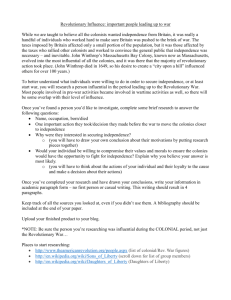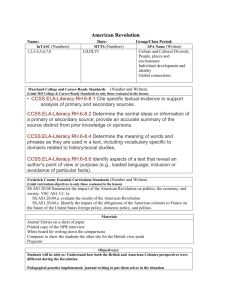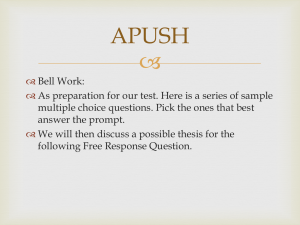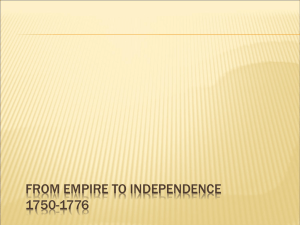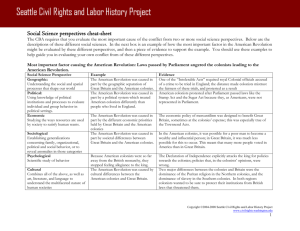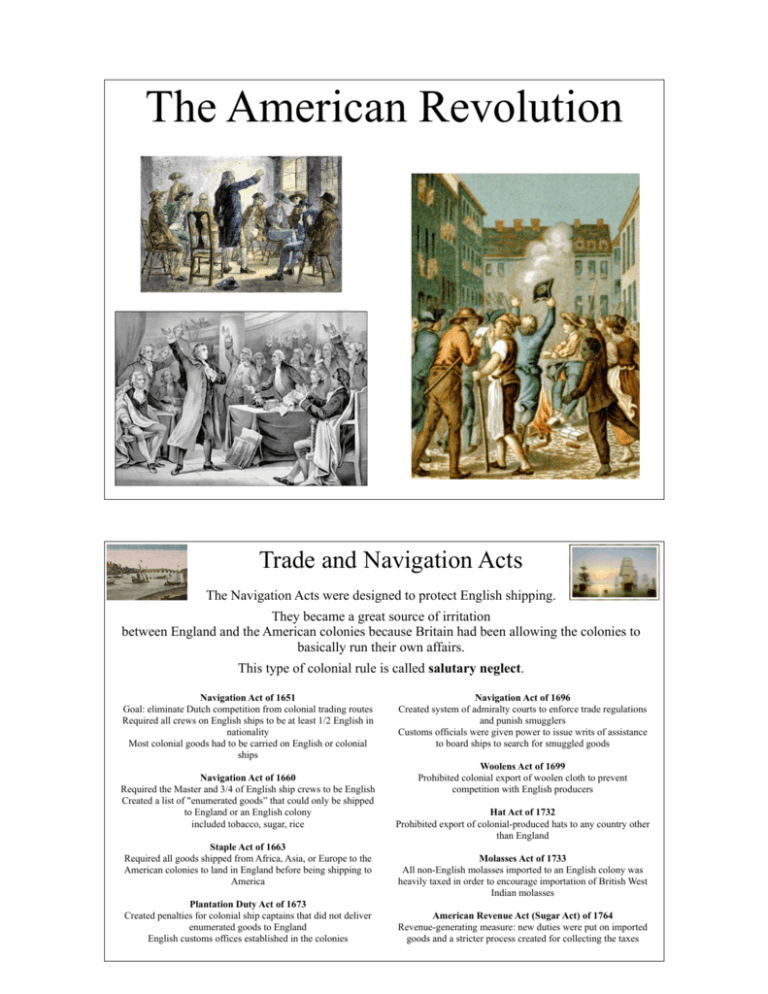
The American Revolution
Trade and Navigation Acts
The Navigation Acts were designed to protect English shipping.
!
They became a great source of irritation
between England and the American colonies because Britain had been allowing the colonies to
basically run their own affairs.
!
This type of colonial rule is called salutary neglect.
Navigation Act of 1651
Goal: eliminate Dutch competition from colonial trading routes
Required all crews on English ships to be at least 1/2 English in
nationality
Most colonial goods had to be carried on English or colonial
ships
!
Navigation Act of 1660
Required the Master and 3/4 of English ship crews to be English
Created a list of "enumerated goods” that could only be shipped
to England or an English colony
included tobacco, sugar, rice
Navigation Act of 1696
Created system of admiralty courts to enforce trade regulations
and punish smugglers
Customs officials were given power to issue writs of assistance
to board ships to search for smuggled goods
!
Woolens Act of 1699
Prohibited colonial export of woolen cloth to prevent
competition with English producers
!
!
Hat Act of 1732
Prohibited export of colonial-produced hats to any country other
than England
!
Molasses Act of 1733
All non-English molasses imported to an English colony was
heavily taxed in order to encourage importation of British West
Indian molasses
Staple Act of 1663
Required all goods shipped from Africa, Asia, or Europe to the
American colonies to land in England before being shipping to
America
Plantation Duty Act of 1673
Created penalties for colonial ship captains that did not deliver
enumerated goods to England
English customs offices established in the colonies
!
!
American Revenue Act (Sugar Act) of 1764
Revenue-generating measure: new duties were put on imported
goods and a stricter process created for collecting the taxes
French & Indian War
1754-1763
Treaty of Paris of 1763
!
Britain got Canada and all the land
east of the Mississippi River from
France
!
BUT - France gave Spain all of the
Louisiana Territory
!
Proclamation of 1763
!
British forbade Americans from
settling west of the Appalachian
Mountains
!
the British didn’t want to have to
protect them
!
colonists had fought for (and won) the land but were now forbidden to settle there (?!)
Taxes, Taxes, Taxes
British needed funds to repay debts from the French and Indian War
Stamp Act of 1765
tax on newspapers, pamphlets, licenses, or other legal
documents
!
Quartering Act of 1765
required colonists to house royal troops
!
Townshend Acts of 1767
placed import duties on paper, glass, paint, and tea
“No Taxation Without Representation”
colonists demanded to have members in Parliament
!
the colonists didn’t really want representatives
!
the number of representatives was based on population
!
there were fewer people in the colonies than in Britain
Events Leading to the Revolution
Boston Massacre
March 5, 1770
!
British soldiers fired into a crowd, killing 5
!
was called a “massacre” as propaganda against British tyranny
Boston Tea Party
December 16, 1773
!
the British-owned East India Company had a monopoly on
the tea trade
!
colonists boarded British ships docked in Boston and
dumped their tea into the harbor
Lexington and Concord
April 19, 1775
!
colonists gathering weapons in Concord - British sent to get them
!
Minutemen in Lexington tried to stop the British
!
British killed eight and wounded ten
!
Ralph Waldo Emerson called it "the shot heard 'round the world"
The Declaration of Independence adopted by Second Continental Congress, July 4, 1776
France Joins the Fight
long-standing French/Anglo rivalry (Seven Years War)
!
at first France only provided loans and some supplies
!
the Americans’ win in the Battle of Saratoga in 1777 convinced France to ally with America
!
Treaty of Alliance and the Treaty of Amity and Commerce on February 6, 1778
Spain and the Dutch Join the War
Spain also disliked Britain and were closer to the French
!
also feared an independent U.S. would inspire Spanish colonies
to revolt
!
Spain did not officially ally with the Americans
!
signed a treaty with France against Britain
Spanish forces overrun the British lines during
the Battle of Pensacola (1781).
the Dutch Republic was also no fan of the British
!
secretly provided weapons to the Americans but
remained officially neutral so the British would not
block their ports
!
when Britain discovered this secret trade agreement
they declared war on the Dutch
The dutch formation in the battle of Dogger
Bank, 5th august 1781.
Effect of Europe on the American Revolution
France
!
contributed military supplies, financial support,
and men
!
some argue that if it were not for the French
the Americans might not have won the war
!
Spain
!
contributed private donations and personal loans
!
opened a second front in Florida
Surrender of Lord Cornwallis
by John Trumbull, depicting the British surrendering to
French (left) and American (right) troops.
Oil on canvas, 1820.
!
“Hessians”
!
German mercenaries hired by the British
(from Hess, a region of Germany; see right)
!
greatly strengthened the British military
“Darmstaedter Handschrift,” 1785, Georg Ortenburg,
Hessisches Militaer.
The Effect of the American Revolution on Europe
European liberal movements gained momentum from the American victory.
(French Revolution)
The most famous “result” of the
American Revolution was the
French Revolution. While
serving as ambassador to
America in Paris in 1789,
Thomas Jefferson wrote, “the
American war seems to have
awakened the thinking part of
this nation from the sleep of
despotism in which they were
sunk.” France also lost their
colony Haiti to a slave uprising
inspired by both the American
and French Revolutions.
America would become a key political and economic player in European affairs
“Iron Tears,” a British View of American Revolution
!
July 03, 2005
The following is the transcript of an NPR interview with Stanley Weintraub, author of “Iron Tears: America's Battle For
Freedom, Britain's Quagmire, 1776-1783,” which he describes as a “dual-sided history of the Revolutionary War that
examines the conflict from both the colonial and British sides.”
!
!
LIANE HANSEN, host:
!
This weekend, to mark the Fourth of July, Independence Day, festivities are scheduled in small towns and large to celebrate
the American Colonies severing ties with the British crown. Seen through American eyes, the new nation's Founding
Fathers were all noble, guided by lofty ideals. But through British eyes, events and people were, not surprisingly, seen quite
differently. Historian Stanley Weintraub provides that perspective in his new book, "Iron Tears: America's Battle for
Freedom, Britain's Quagmire, 1775-1783." When he spoke to us last week, he explained that the British felt the Colonies
were indebted to them and should be more appreciative.
!
Professor STANLEY WEINTRAUB (Author, "Iron Tears"): They felt that the American colonists owed them a great deal
for protection, for purveying their culture, for providing them with manufacturers. But what they didn't say is that they
prevented manufacturers from being made in American Colonies themselves; they wanted to keep the economy dependent
on England. So when the American Revolution actually began, there was no way to make gunpowder in America. There
were no armories to make rifles or cannon; they had to import them or take them from the British. We were totally
unprepared for war because the British made sure we weren't by making them dependent. And so the resentment in America
was dependency.
!
HANSEN: Well, what about British Parliament? I mean, was everyone in agreement about how to deal with the American
Colonies?
!
Prof. WEINTRAUB: No. The British Parliament was quite unrepresentative. The British Parliament largely was based on
men who were elected from the small towns and farmlands and not from the burgeoning big cities that were growing up
with the Industrial Revolution. So Manchester or Birmingham didn't have any seats in Parliament, and the British said,
`Why are you complaining, you in America? The same thing's true over here. We're not representative, but we're happy.'
!
HANSEN: Hmm. How important, though, were the Colonies to Britain?
Prof. WEINTRAUB: They were very important as a source of raw materials, particularly agricultural materials and tobacco.
But the Colonies were also important as a source of pride. We think in terms of `the jewel in the crown' applied to India, but
that term was really first applied to the American Colonies. They were the jewel in the king's crown.
!
HANSEN: So you have this deep resentment growing on both sides, on the British side and on the American side, and the
protests against the taxes were beginning to grow. Did the view begin to change? Did the resentment begin to build?
!
Prof. WEINTRAUB: The resentment built on the part of the patriots, patriots who were really extremists, largely in the
Northeast, like Massachusetts. And when the Tea Party occurred and the bales of tea were thrown overboard, Benjamin
Franklin actually said, `This was an act of piracy and the Americans should repay the British for the tea.' So it took a long
time before people we consider the super patriots of the country to get around to the extreme view of separation.
!
HANSEN: Let's go to April 19th, 1775; British troops firing on American militia at Lexington and Concord. The idea of
going to war--Did all the Britons think that going to war with America was a good idea?
!
Prof. WEINTRAUB: They were very surprised when we went to war. They were surprised especially when they lost.
!
(Soundbite of laughter)
!
HANSEN: But were--well, they were surprised when it actually started.
!
Prof. WEINTRAUB: When it started. They weren't prepared for it, and they hadn't realized that the American militias that
were building up at the time, particularly in places like Virginia and in Massachusetts, were armed. They were armed
largely because they had hunting rifles. They had very little sources of ammunition. And the British at Bunker Hill lost a lot
of men, and it took so long before the news got to England--the patriots were very shrewd. They rushed the news and
newspapers to England faster than the British could send their official communiques. And so the American spin, the
patriots' spin on the war, affected England before the government could put its own spin on the war.
!
HANSEN: So how did the British public first react to the idea of war with...
!
Prof. WEINTRAUB: They reacted with shock, especially with the casualties that came across. And they reacted with shock
when they realized that their taxes would have to go up. They couldn't get taxation out of America. And not only did their
taxes go up, their taxes were on every little thing one could imagine. Not merely tea or stamps or newspapers, but even
rabbit hair for women's hats was taxed. Ink, paper, all kinds of things were taxed. And these were nuisance taxes because
the British didn't want to raise the property tax, but eventually they had to do that, too. And so the war was largely
unpopular because it was an economic dent in the British.
!
HANSEN: So in talking about the execution of the war, was Britain's heart really in it?
Prof. WEINTRAUB: Not the heart of the merchants. The merchants were very hostile to the war. This was the radical
center of the war because the businessmen were taking a big hit. They wanted the trade to continue, and there was no trade.
!
HANSEN: Hmm. So ultimately, why do you think Britain lost the war?
!
Prof. WEINTRAUB: Britain lost the war because General Washington had two other generals on his side. One was
`General Demography,' population. The population was burgeoning. And the other general that Washington had on his side
was `General Atlantic,' that is Atlantic Ocean. It took two and a half months to cross the Atlantic by sail against the wind.
By the time the Donald Rumsfeld of that war, the secretary for America, Lord George Germaine, sent his orders across to
America 3,000 miles away, it was too late; the orders were moot. Things had changed. It took two and a half months. So
General Atlantic, meaning `General Distance,' and `General Demography,' meaning population, were really generals who
aided Washington tremendously.
!
HANSEN: Why was it important for you to present the Revolutionary War from the British point of view?
Prof. WEINTRAUB: The losers seldom ever write the history.
We've always had flag-waving histories. And it's nice to have
flag-waving histories, but I think we needed some balance to
see what the war was like from the lens of the British. How
did they see it? How did they take to it?
!
HANSEN: Stanley Weintraub is the Evan Pugh Professor
Emeritus of Arts and Humanities at Pennsylvania State
University. His newest book is "Iron Tears: America's Battle
for Freedom, Britain's Quagmire, 1775-1783," published by
the Free Press.
!
Thanks so much for coming in.
!
Prof. WEINTRAUB: You're welcome. Glad to be with you.
!
Copyright © 2005 NPR. All rights reserved. No quotes from the materials
contained herein may be used in any media without attribution to NPR. This
transcript is provided for personal, noncommercial use only, pursuant to our
Terms of Use.
Cow representing English commerce being milked and dehorned by France,
Spain, Holland, and the United States while the British lion sleeps, during
the American Revolutionary War.
Credit: Library of Congress, Washington, D.C.





